Chinese-Arab cooperation embraces new opportunities amid pandemic
The fifth China-Arab States Expo, held as scheduled despite the COVID-19 pandemic, concluded on Sunday in Yinchuan, capital of northwest China's Ningxia Hui Autonomous Region. During the four-day event, delegates from home and abroad saw 277 projects inked and reached common ground in fields of cooperation such as the digital economy and clean energy.
The fifth China-Arab States Expo, held as scheduled despite the COVID-19 pandemic, concluded on Sunday in Yinchuan, capital of northwest China's Ningxia Hui Autonomous Region. During the four-day event, delegates from home and abroad saw 277 projects inked and reached common ground in fields of cooperation such as the digital economy and clean energy.
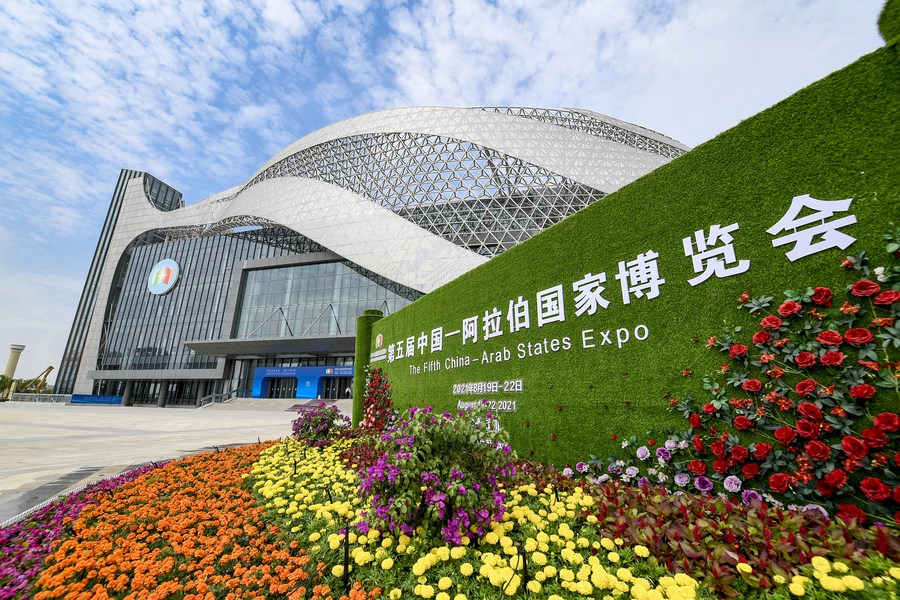
Photo taken on Aug. 18, 2021 shows the main venue of the fifth China-Arab States Expo in Yinchuan, northwest China's Ningxia Hui Autonomous Region. [Photo/Xinhua]
China, the largest trading partner of Arab states, has the confidence to further expand cooperation with Arab countries in emerging fields such as the digital economy, new energy and artificial intelligence (AI), said Chinese Vice Commerce Minister Qian Keming via videolink at the opening ceremony.
BRI cooperation platform
As one of the expo's guest countries, Morocco erected a national pavilion with an area of over 300 square meters, in which visitors could gain an overview of its culture, tourism, aerospace and renewable energy development. It also held a trade and investment promotional event.
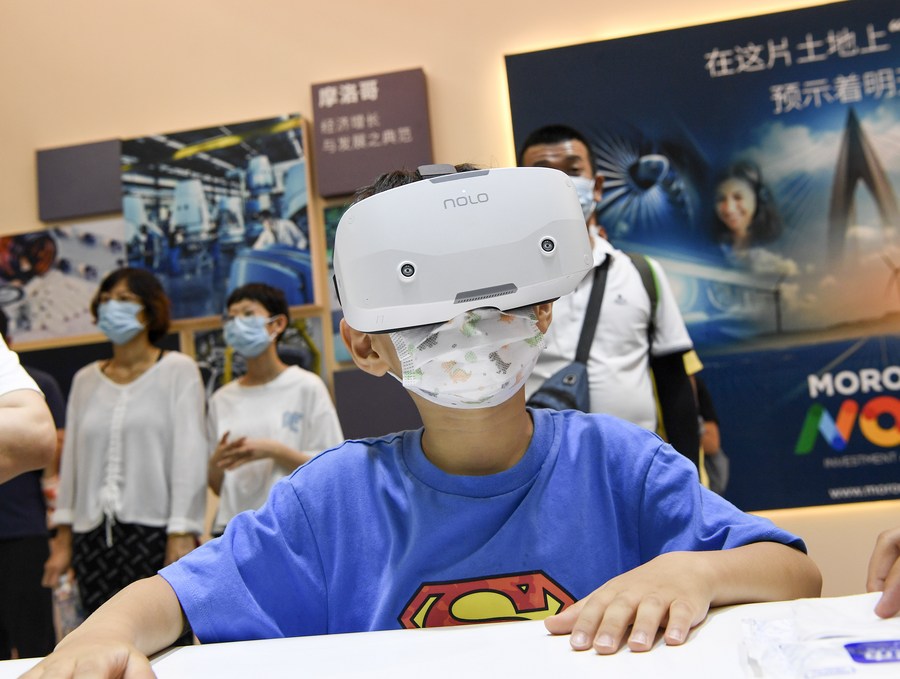
A child learns about local culture through a VR device at the Morocco pavilion of the fifth China-Arab States Expo in Yinchuan, northwest China's Ningxia Hui Autonomous Region, Aug. 22, 2021. [Photo/Xinhua]
The China-Arab States Expo has enhanced bilateral enterprise cooperation and non-governmental exchanges in a pragmatic and innovative way, said Nasser Bouchiba, president of the Africa-China Cooperation Association for Development in Morocco. He said it has injected strong impetus into mutual development, playing a leading and demonstrative role for Arab states and China to jointly build a high-quality Belt and Road.
Facing the pandemic and profound global changes, participants from China and Arab states said they believed the two sides need more than ever to seek common development and tap cooperation potential.
The expo, which was downsized this year for COVID-19 prevention and control, attracted thousands of enterprises from home and abroad at its offline and online sessions.
Senior officials from countries such as the United Arab Emirates (UAE), Saudi Arabia, Egypt and Tunisia made speeches via video, aiming to attract more investment and business.
Data shows that 277 deals worth an approximate total of 156.7 billion yuan (about 24 billion U.S. dollars) were signed at the expo, covering fields including electronic information, clean energy, new materials, green food, and capacity cooperation.
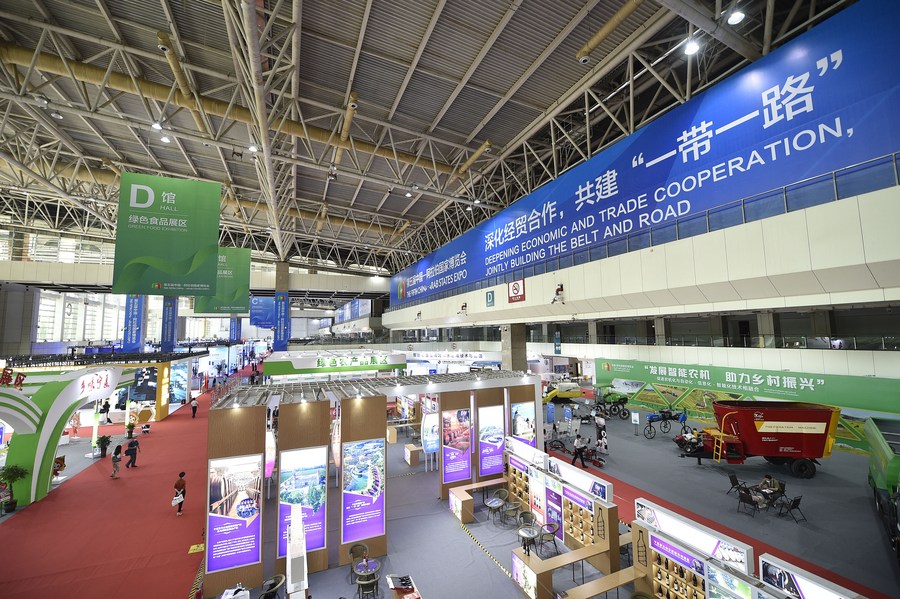
Photo taken on Aug. 19, 2021 shows the green food exhibition area of the fifth China-Arab States Expo in Yinchuan, northwest China's Ningxia Hui Autonomous Region. [Photo/Xinhua]
Arab countries and China are highly complementary in their economies and enjoy broad cooperation prospects, which drives the continuous development of practical bilateral cooperation based on mutual benefit, Moroccan Prime Minister Saad Eddine El Othmani said via video.
"The signed projects reflect that the expo has become an important platform to add new momentum for the Belt and Road Initiative (BRI) and bring about huge opportunities for the complementary advantages and open development of countries and regions along the Belt and Road," said Zhao Yongqing, executive vice-chairman of Ningxia regional government.
New opportunities
In line with the current needs of the two sides, the digital economy and clean energy have become the focus of this year's event, creating new opportunities and space for further cooperation.
In the UAE's economic recovery plan announced in 2020, the UAE government said it will encourage investment in the digital economy in the long term, focusing on cutting-edge technologies such as 5G and AI in order to promote digital transformation and economic recovery.
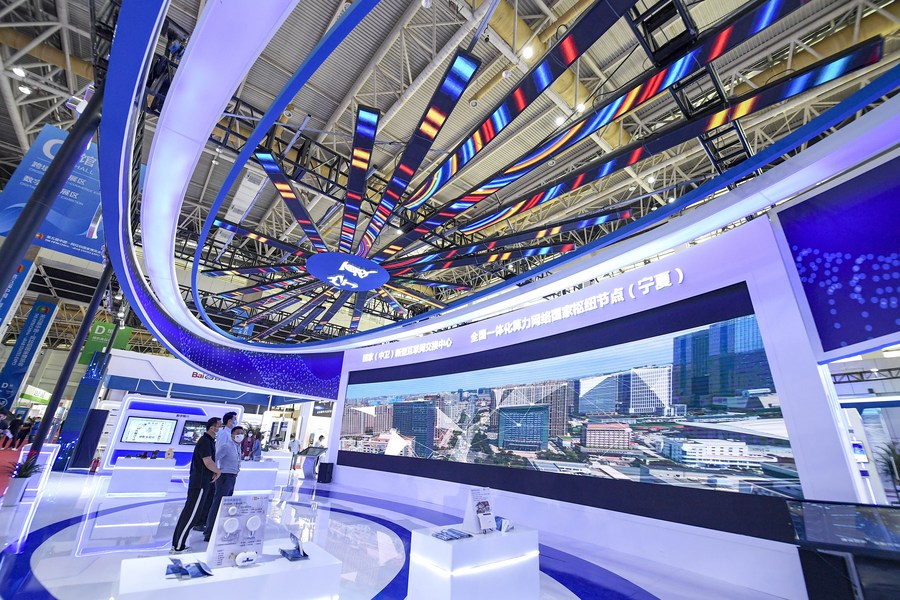
People visit the digital economy exhibition area of the fifth China-Arab States Expo in Yinchuan, northwest China's Ningxia Hui Autonomous Region, Aug. 22, 2021. [Photo/Xinhua]
A report on 2021 Chinese-Arab trade and economic cooperation released at the expo predicts Arab states will have an increased demand for information infrastructure for years.
Some Arab countries lack the capabilities to build communication networks, which means huge market opportunities for Chinese enterprises that are experienced in engineering design and construction and have strong capabilities to serve overseas markets.
Chinese telecommunication giant Huawei has helped some Arab countries build infrastructure such as 5G networks and national AI centers, and apply digital technology to customs and ports to facilitate cross-border trade.
Tunisian President Kais Saied on Thursday hailed the "fruitful" cooperation between Tunisia and China in recent years while praising Chinese companies for contributing to Tunisia's digital economy. He also highlighted the ample opportunities and promising prospects for the two countries to diversify and strengthen bilateral ties, particularly in the education, transport and health sectors.
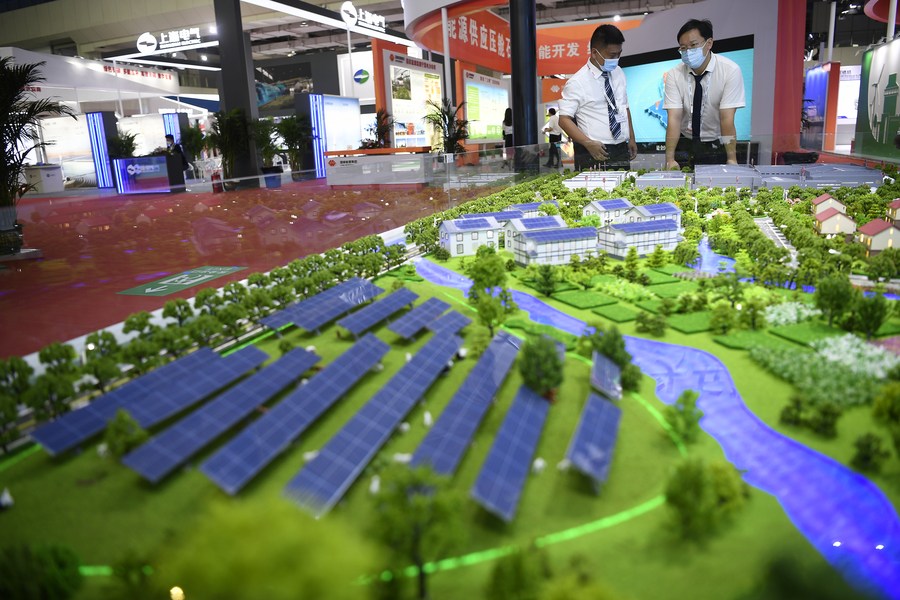
A photovoltaic product model is seen at the fifth China-Arab States Expo in Yinchuan, northwest China's Ningxia Hui Autonomous Region, Aug. 20, 2021. [Photo/Xinhua]
As carbon neutrality is a global goal, new energy has become a potential field for cooperation between the two sides.
"Now, with the international consensus that we must act to mitigate climate change, scaling up renewable energy adoption has become a global trend," said Awaidha Murshed Ali Murshed Almarar, director of the Energy Authority of Abu Dhabi, the United Arab Emirates.
"Today's forum is an important event to explore new opportunities for cooperation on zero and low-carbon energy technologies such as hydrogen and CCUS (carbon capture, utilization and storage) that match our energy transition goals, and build resilience into our energy industry and, furthermore, support our quests for a sustainable and peaceful future for all."
Chinese energy firms have been engaged in the energy transitions of Arab states. Shanghai Electric took part in constructing a photovoltaic and photothermal hybrid power station in Dubai, currently the largest of its kind worldwide.
"China is willing to help Arab states speed up their transitions toward low-carbon energy. We will help them develop and utilize wind and solar energy resources based on local conditions," said Zhang Jianhua, head of China's National Energy Administration.

